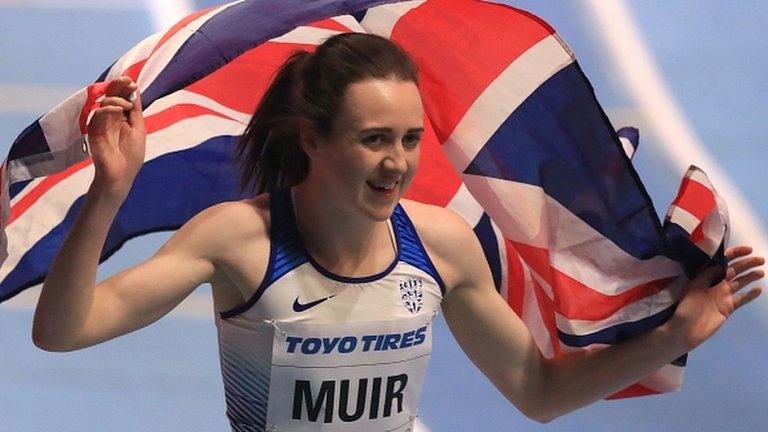Sebastian Coe helped to IAAF presidency by 'corrupt' official
- Published
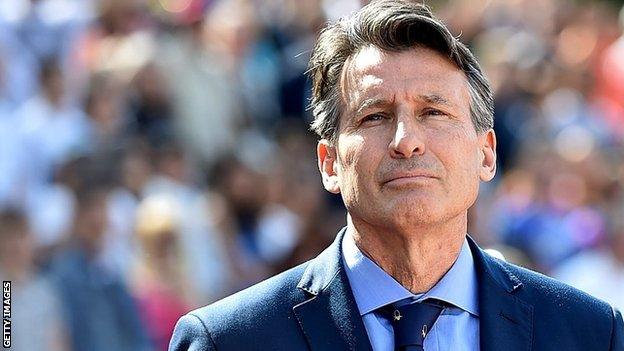
Lord Coe became IAAF president during a growing corruption scandal involving blackmail and state-sponsored doping in Russia
BBC Panorama has learnt that Lord Coe won the presidency of the International Association of Athletics Federations with the help of the man at the centre of the sport's doping scandal.
Texts seen by the BBC suggest ex-IAAF consultant Papa Massata Diack, now wanted by Interpol, secured votes for Lord Coe's August election win.
The programme also suggests Coe may have misled the UK parliament.
The double British Olympic 1500m champion, 59, denies any wrongdoing.
The text messages suggest Diack, son of the disgraced former IAAF president Lamine Diack, helped secure African delegate votes for Coe.
The investigation also uncovers evidence Coe may have misled a parliamentary select committee over when he first became aware of the allegations of doping and corruption in athletics.
You can watch Panorama: Seb Coe and the Corruption Scandal on the BBC iPlayer.
Coe became IAAF president in the midst of a growing corruption scandal involving blackmail and state-sponsored doping in Russia.
Within weeks of his election, his predecessor, Diack Sr, was arrested and a warrant issued for the arrest of his son, a marketing consultant for the IAAF.
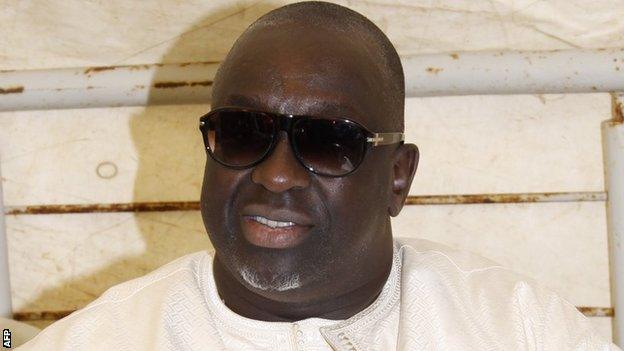
Papa Massata Diack was part of the IAAF's inner circle
The corruption scandal had originally come to light in a German television documentary in December 2014.
The documentary reported that Russian and IAAF officials, including Diack Jr, had conspired to cover up doping by the Russian marathon runner Lilya Shobukhova, as well as attempt to blackmail her.
Coe quizzed over his IAAF record
Coe was not personally caught up in any of the doping or corruption allegations, but he had been a member of the IAAF council since 2003 and a vice-president since 2007.
He was asked by MPs at a meeting of the Culture, Media and Sport select committee last year why he had not been more prominent in pressing the doping issue while he was a vice-president.
He told them: "I was certainly not aware of the specific allegations that had been made around the corruption of anti-doping processes in Russia."
When he was asked if he was aware of allegations against Diack Jr, Coe replied: "Well, they were allegations that were aired in the ARD documentary."
But evidence seen by the BBC and the Daily Mail, external reveals that, four months before the German television documentary was broadcast, an email was sent to Coe containing a number of attachments detailing the corruption, extortion and bribery claims, as well as the suggestion Diack Jr could have been involved.
The attachments included a detailed complaint from the agent of Shobukhova, alleging she had paid Russian and IAAF officials 450,000 euro (£356,000) to cover up her doping and allow her to run in the London 2012 Olympics.
Damian Collins MP, who sits on the Culture, Media and Sport Committee, said: "I think his (Lord Coe's) answer to the select committee was deliberately misleading to create the impression that he was totally unaware of any specific allegations of this kind.
"These involved serious criminal matters. The right thing to do would be to put that information into the hands of the criminal authorities straight away."
He added: "If he won't be drawn on the past and what he knew and can't come up with a compelling argument for the way he conducted himself, then I don't see how he could continue as president of the IAAF because he would lack the public support to do so."
In a statement, Coe, who won 1500m gold at the 1980 and 1984 Olympics, said he was forwarded emails about the corruption allegations, which he then sent on to the IAAF ethics committee, leaving it to investigate.
His director of communications, Jackie Brock-Doyle, added: "He did not feel it was necessary to read the attachments.
"You may think this shows a lack of curiosity. He, and we, would argue that it shows a full duty of care, ensuring the right people in the right place were aware of allegations and were investigating them."
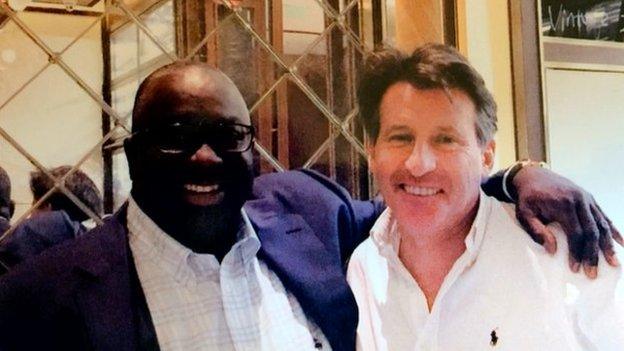
Papa Massata Diack and Sebastian Coe
Diack Jr claims that he and Coe met during the IAAF presidential campaign, twice in Beijing and once in the Bahamas.
This was almost a year after Coe was sent the email about allegations against Diack Jr and several months after it was revealed the Senegalese had been accused of corruption on a grand scale.
The claims of Diack Jr, who has been banned for life by the IAAF, have to be treated with extreme caution, but there is evidence - in the form of emails and text messages between Diack Jr, Coe and Nick Davies, the IAAF's head of communications - that he did indeed help Coe during his presidential bid.
At the time, Davies was helping Coe's election campaign.
The text messages on Coe's way to the top
The following are some of text messages, seen by Panorama, which call into question how Coe ran his successful IAAF presidency election campaign.
These messages are from 2015 - several months after the world knew Diack Jr had been accused of dishonesty on a grand scale.
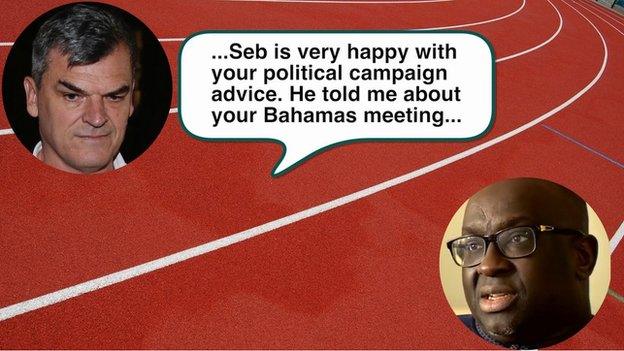
Sent from Nick Davies to Papa Massata Diack on 7 May, 2015
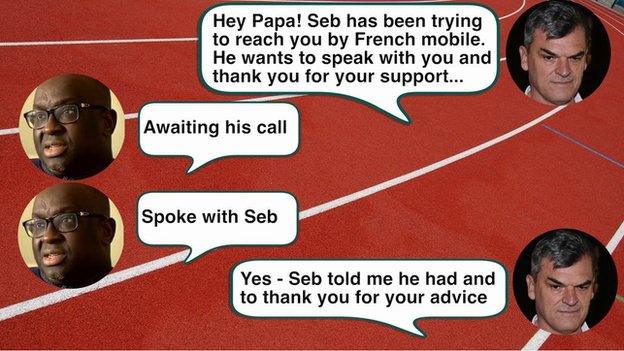
An exchange between Davies and Diack Jr on 10 August, 2015
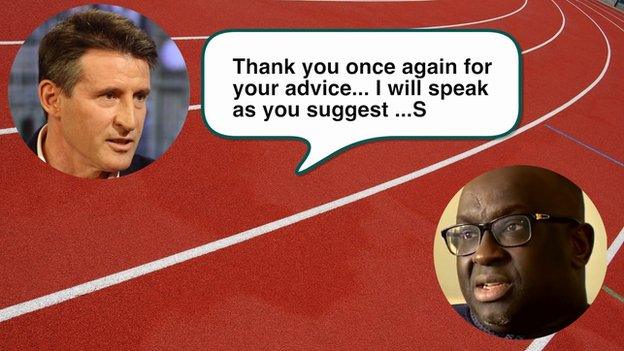
Text sent by Lord Coe to Diack Jr on 11 August, 2015
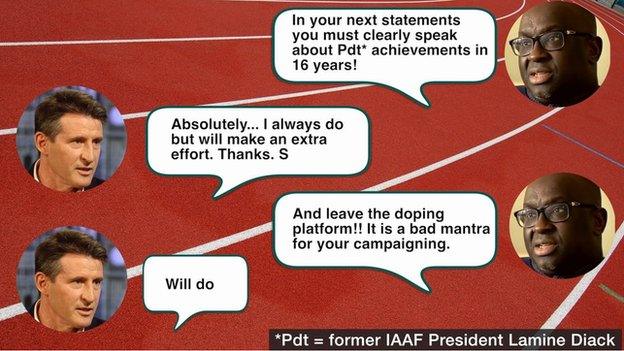
An exchange between Diack Jr and Coe on 13 August, 2015
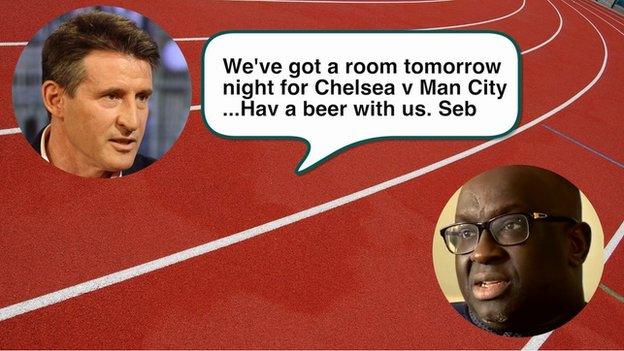
A message sent by Coe to Diack Jr on 15 August, 2015
Coe also appeared keen to ensure Diack Jr made an important meeting. Diack Jr told the BBC that the "friend" mentioned in this message was Hamad Kalkaba Malboum, president of the Confederation of African Athletics, whose support was crucial.
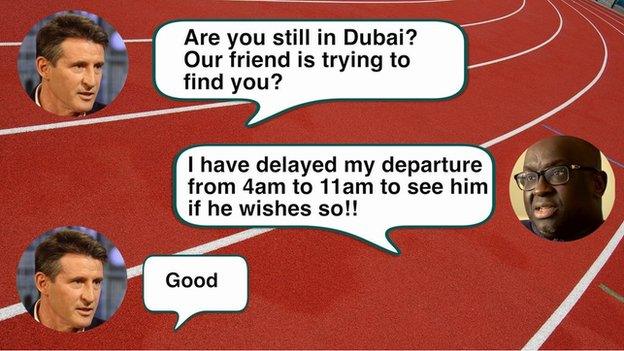
An exchange between Coe and Diack Jr on 15 August, 2015
In the days before the election, Diack Jr appeared to provide information on the election tactics of Coe's rival, Sergey Bubka, the Ukrainian former Olympic pole vault champion.
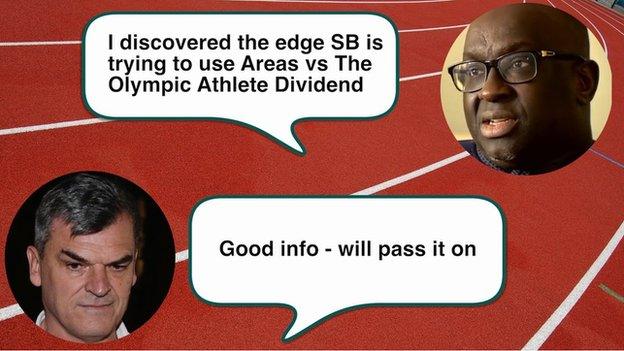
Texts between Diack Jr and Davies on 17 August, 2015
Diack Jr also seemed to provide intelligence on how IAAF delegates might vote in the presidential election, asking Davies to get a message to Coe to speak to Phil Knight of Nike for confirmation from the USA delegate Steve Miller.
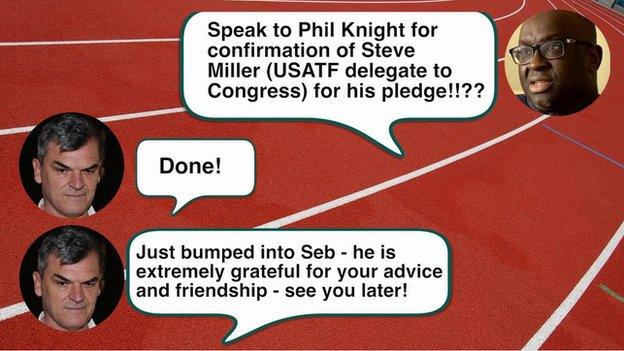
An exchange between Diack Jr and Davies on 17 and 18 August, 2015
This next message refers to the 24 out of 30 nations Diack Jr claims he could talk to and get support for Coe. The Briton won the election by a margin of 23 votes, 115-92.
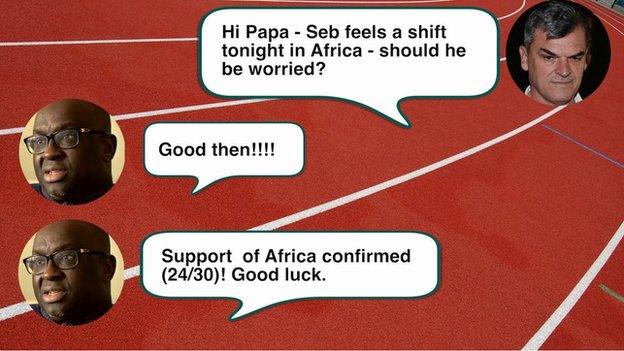
Texts between Davies and Diack Jr on 18 August, 2015
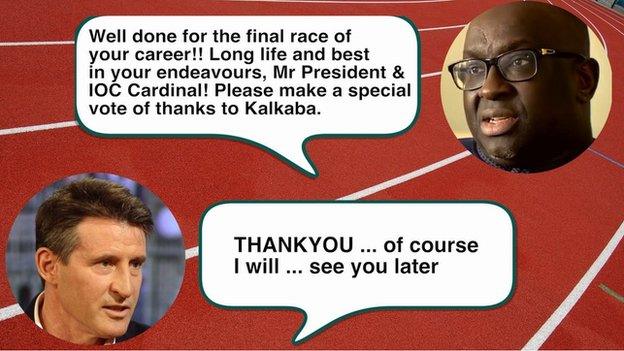
An exchange between Coe and Diack Jr on the 19 August, 2015
The BBC showed these text messages to Jack Robertson, a former chief investigator for the World Anti-Doping Agency and the man who investigated the Shobukhova doping scandal.
"It appears that Coe is taking advice from someone who is at the centre of this scandal to extort athletes," said Robertson.
"It's wrong on so many fronts. It's not just disappointing, it's disgusting."
In an interview with Panorama, Diack Jr said Lord Coe would not have become IAAF president without his help.
"If he had not the blessing of Lamine Diack or my support, he would have never been elected as the IAAF president," he said. "He knows that."
Coe refused the BBC's request for an interview to discuss his relationship with Diack Jr and said the suggestion he sought the Senegalese's support was wrong.
The Briton's spokeswoman added: "As with any campaign, lots of people offer advice - wanted or not, some helpful, some not. You try to be civil but wary.
"This was the case with Mr Diack. He sent messages of support whilst at the same time supporting other candidates and accusing Seb Coe of leading a British media campaign against both him and his father."
Diack Jr is currently living in Senegal and Interpol has issued a notice for his arrest over allegations of bribery and corruption, which he rejects.
"I have never, never, never been involved in any payment or any extortion of Lilia Shobukhova," he said.
"All we did about this Russian affair was to protect our World Championships. There was no cover-up of any, any, any doping matters."
Last week, the IAAF's ethics board announced that Davies was one of three IAAF members being provisionally suspended over allegations they took money to delay naming Russian drugs cheats.
Given he is now the subject of an IAAF investigation, Davies said it would be inappropriate for him to comment on the Panorama programme.
But Robertson is happy to speak out and said: "I hate to use the word, but he [Coe] got in bed with the devil to win the election.
"I don't mean to call Papa Diack the devil, but he was certainly in the middle of the investigation.
"And if he [Coe] makes a decision such as that, how can we trust him with other decisions? My bottom line is clean athletes deserve better."
The Panorama programme airs on the eve of an IAAF meeting in Vienna to decide whether to allow Russian athletes to compete at the Rio Olympics.
- Published16 June 2016
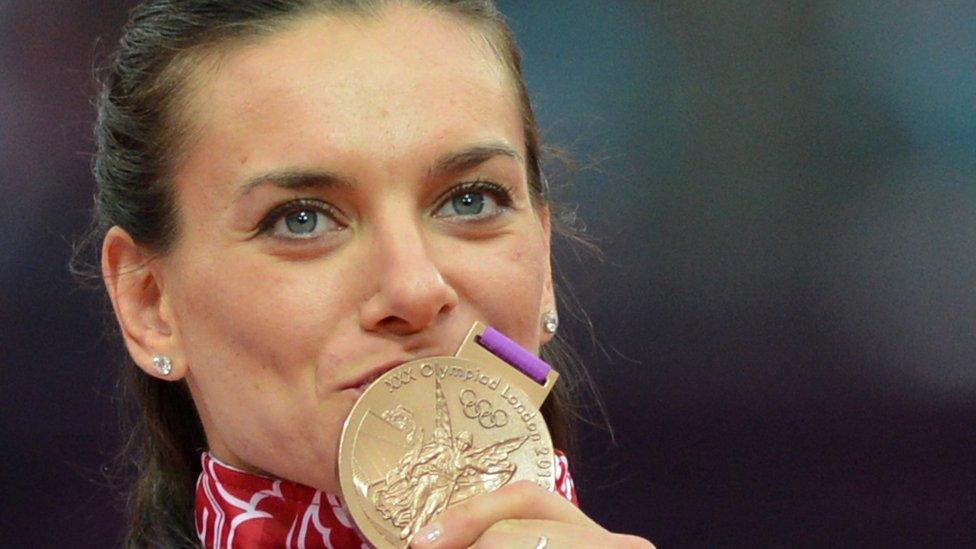
- Published16 June 2016
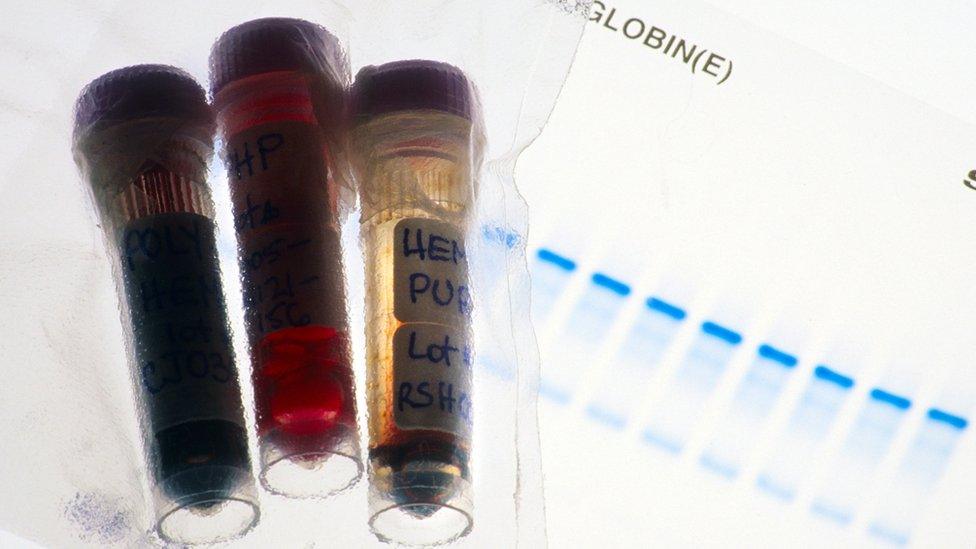
- Published19 August 2015
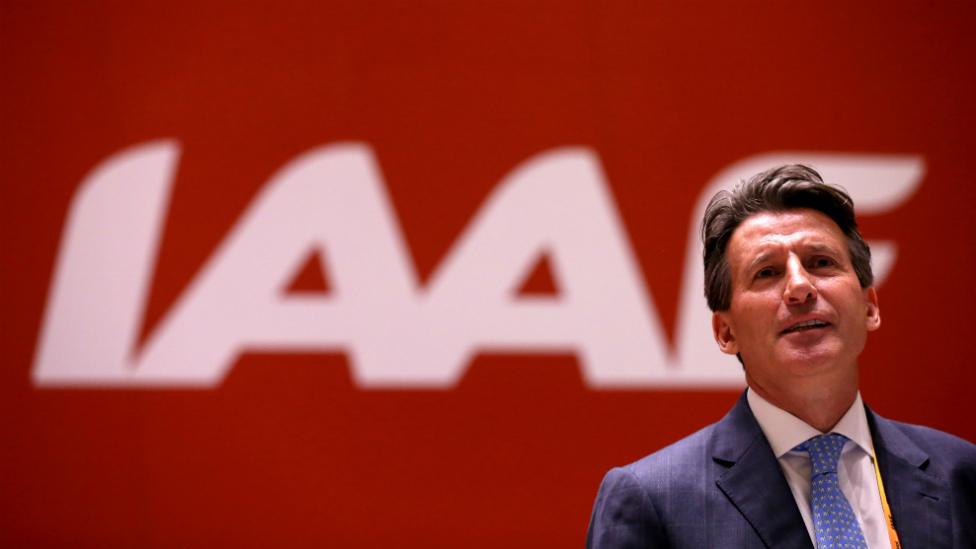
- Published7 December 2016
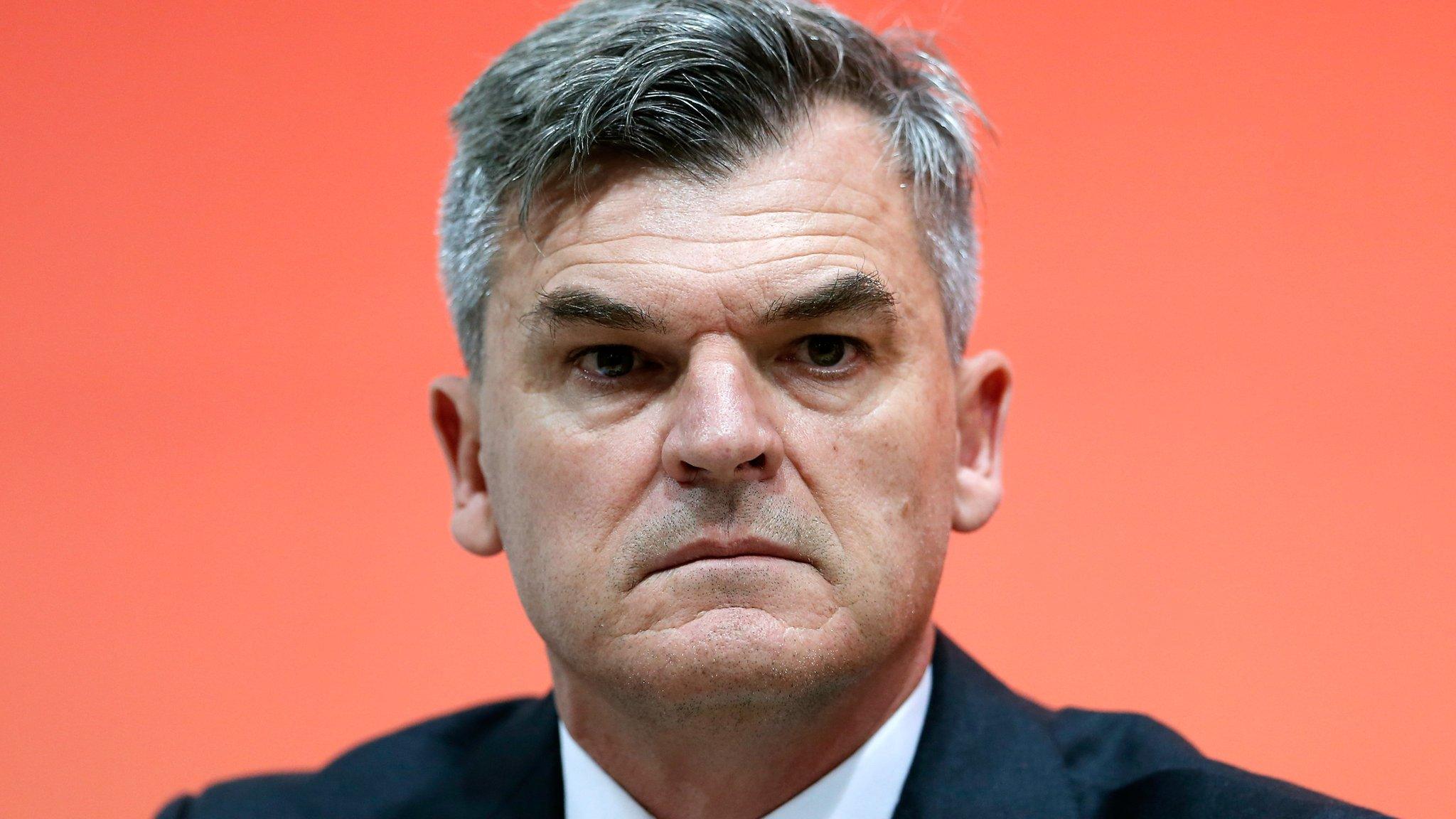
- Published3 March 2018
